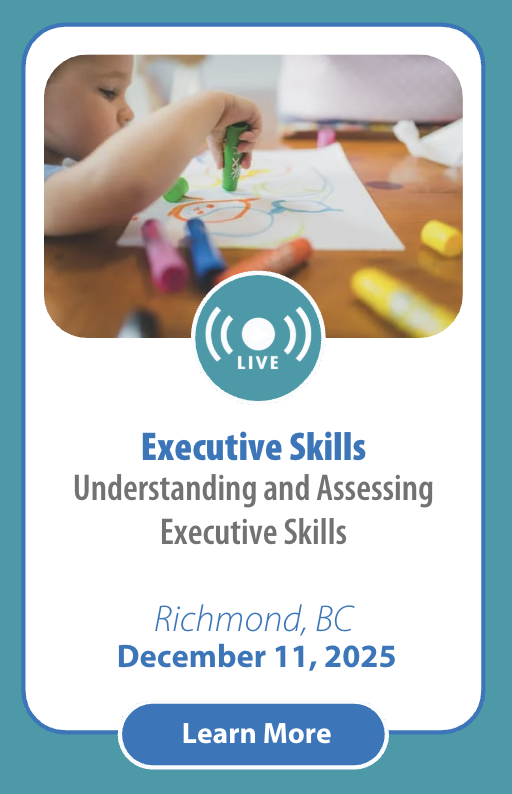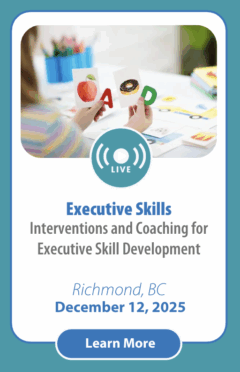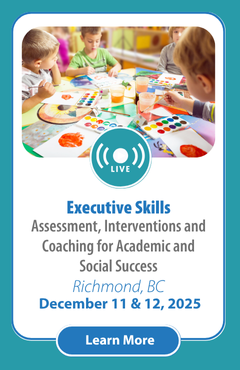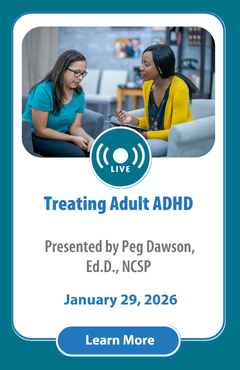Description
LIVE STREAM: December 11, 2025 from 8:30am – 4:00pm (Richmond, BC) Please adjust your start time according to your specific time zone.
ON-DEMAND: Recorded footage & course content (certificate, videos, quiz) will be available until January 20, 2025. Please allow 3 – 10 business days for footage to be processed. Extensions cannot be granted under any circumstances.
Executive skills—often referred to as “the hidden curriculum”—are critical cognitive abilities that underpin academic success. These include skills like task initiation, sustained attention, working memory, planning, organization, and goal-directed persistence. While these skills are essential for students to thrive in school, they are rarely explicitly addressed in standard curriculum frameworks.
Research shows that executive skills continue to develop well into early adulthood, and their growth can be influenced by factors such as experience, environment, and direct instruction. It is essential for educators to recognize the role these skills play in learning and to adopt strategies that promote their development in students.
Morning Session: Foundations of Executive Skills
- Overview of Executive Skills: Introduction to the cognitive functions necessary for task management, such as working memory, emotional regulation, task initiation, and impulse control.
- Developmental Progression: Learn how executive skills evolve from infancy through adolescence and the factors that impact this progression, including neurological development and environmental influences.
- Executive Skills and Brain Function: Understand the neuropsychological basis for executive skills and how disruptions in these processes can lead to executive dysfunction.
- Self-Assessment: Participants will complete a personal executive skills self-assessment to identify their strengths and areas for growth.
Key Activities:
- Group discussions on the developmental trajectory of executive skills.
- Case studies to explore how deficits in executive function manifest differently.
Afternoon Session: Assessment and Environmental Modifications
- Assessing Executive Skills: Learn how to identify executive skill deficits through formal assessments, behavior rating scales, and teacher/parent/student interviews.
- Modifying the Environment: Discover strategies for adapting the home and classroom environment to support students with executive dysfunction. This includes environmental changes, task modifications, and adjusting adult interactions to promote success.
Key Activities:
- Brainstorming session to design classroom and home-based environmental modifications that support children, adolescents and young adults with weak executive skills.
Day 1: Understanding Executive Skills and Assessment
- 8:30 – 10:30: Overview of Executive Skills & Cognitive Functions
- 10:45 – 12:00: Developmental Progression of Executive Skills
- 1:00 – 2:30: Assessing Executive Skills in Students (Formal and Informal Tools)
- 2:45 – 4:00: Modifying Environments to Support Executive Skills Development
Education and Clinical Professionals: K–12 Classroom Teachers, School Counsellors/Psychologists, Learning Assistance/ Resource Teachers, School Administrators, School Paraprofessionals including Special Education Assistants, Classroom Assistants and Childcare Workers. All other professionals who support students including but not limited to: Nurses, Social Workers, Psychologists, Clinical Counsellors, Family Therapists, Occupational Therapists, Speech Language Pathologists, Addiction Counsellors, Youth Workers, Mental Health Workers, Probation Officers, and Early Childhood Educators.
Dr. Peg Dawson: In over 40 years of clinical practice, Dr. Peg Dawson has worked with thousands of children who struggle at home and in school. At the center of their struggles are often weak executive skills. Along with her colleague, Dr. Richard Guare, she has written numerous books on this topic for educators, mental health professionals, and parents, among them Smart but Scattered, Smart but Scattered Teens, Executive Skills in Children and Adolescents, and Coaching Students with Executive Skills Deficits. Peg is also a past president of the National Association of School Psychologists, and the International School Psychology Association, and is a recipient of NASP’s Lifetime Achievement Award.
| Registration | Early bird Fee | Regular Fee |
|---|
| Individual Enrollment | $244.00 | N/A |
| Group 3 - 7 | $183.00 | N/A |
| Group 8 - 15 | $122.00 | N/A |
| Group 15+ | $97.60 | N/A |
| Full-Time Student | $97.60 | N/A |
All fees are in Canadian dollars ($CAD) and per person.
How to Purchase a Group Rate
-
Add Seats to Your Cart
Select the total number of seats you need for your group and add them to your cart. Each seat represents one participant who will be enrolled in the course.
-
Complete Your Purchase
Proceed to checkout and complete the payment for the total number of seats needed for your group.
-
Contact Our Office
Once your purchase is complete, please contact our office at webinars@jackhirose.com with your order number.
-
Receive Group Enrollment Link
We will send you a unique link that you can distribute to group members. Group members will be required to use this link to complete receiving access to the course.
If you have any questions or need assistance, don’t hesitate to reach out.
Fees are per person, seat sharing is not allowed. Please respect this policy, failure to comply will result in termination of access without a refund. For group rates please contact webinars@jackhirose.com







